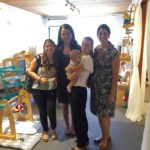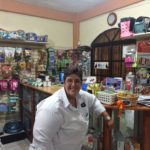I had two goals for the summer before my last semester with IPED: to practice my Spanish, and to gain on-the-ground work experience outside of the US and in my chosen field of small business and entrepreneurship development. So last fall, as Dr. S tasked us to formulate proposals for summer endeavors in our Project Management course, I sent a quick email to some former colleagues with whom I managed a women’s entrepreneurship working group at the Aspen Network of Development Entrepreneurs (ANDE). My task was simple: “Can you keep an eye out for any potential opportunities for projects/internships in women’s entrepreneurship in Latin America and pass them my way?”
The next May, I was on my way to Guatemala to attend a workshop on women’s entrepreneurship.I was invited to develop a policy paper on creating holistic women’s entrepreneurship training programs in developing countries. After the initial 3 days in Guatemala, I spent 6 weeks in Mexico City with Value for Women and ANDE (with support from Oxfam’s Women in Small Enterprise Program), meeting with stakeholders, conducting research, and writing a policy paper that focuses on autonomous decision-making of women business owners and appropriate ways to include men in women’s entrepreneurship initiatives.

Concurrently, I applied to be part of a research and evaluation consortium with Emory University. In February, I was selected to be part of a group of graduate students to help Emory carry out research with TechnoServe Inc., a non-profit organization with entrepreneurial accelerator programs in four Central American countries (Nicaragua, El Salvador, Guatemala and Honduras). The ultimate goal of this research is to see what works with accelerator programs for developing country entrepreneurs: what types of services and trainings are most valuable, and what broader macro socioeconomic factors impact an entrepreneur’s success.
During the two weeks spent in Central America, our group from Emory interviewed dozens of TechnoServe entrepreneurs, advisors, and sector experts in Nicaragua and El Salvador. These interviews were truly the highlight of my summer. For example, in Nicaragua, we interviewed Karen Tijerino, founder of Cerveza Artesanal Pinolera, one of the country’s six craft breweries. Karen founded the company last year and has been leading Nicaragua’s burgeoning craft beer industry as the only woman brewer (with an all woman staff) and one of the only native Nicaraguan brewers. In a small town in northern Nicaragua, we spoke with Leana Gámez- who transformed her grandmother’s small, home-based bakery into a sought-after brand available in almost all of western Nicaragua- and ate a lot of delicious, carb-y treats.



TechnoServe’s program in El Salvador has a specific focus on women entrepreneurs, and we were able to speak with nine of the over 60 amazing ladies who participated in the program this past year. Businesses ranged from a beauty product supplier, to a children’s furniture producer, to a veterinarian whose business sees over 1000 animals every month (and has a really adorable Facebook page)! We were also shuttled around the city by the fabulous Linea Rosa, a taxi company founded by a TechnoServe entrepreneur in San Salvador, driven by women, providing safe transportation for women passengers.
An exciting part about this project is the broad reach we hope these interview findings will have. I’ll be participating in a session to present this research at the SOCAP (Social Capital Markets) Conference in San Francisco in September and am thrilled to share what we have learned with other accelerators and entrepreneurs. I’ll also be happy to share the final reports from both projects with any interested IPEDers!
As an Arrupe Fellow, I was really lucky to have the flexibility in my summer funding to create a program that fit my personal and professional goals. It was also a perfect opportunity to apply so much of what I had learned over the past year of IPED to real world international development projects. I’m now looking forward to using the learnings from this summer throughout my last semester.


